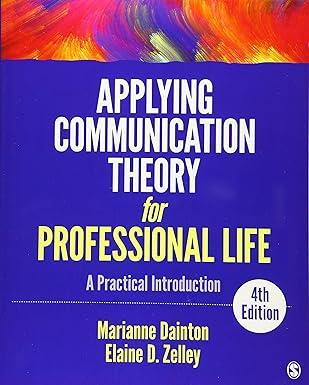When the Pennsylvania Gaming Control Board approved applications for the development of two casinos within the city
Question:
When the Pennsylvania Gaming Control Board approved applications for the development of two casinos within
the city limits of Philadelphia, controversy immediately ensued. Before the state had unveiled the approved casino
locations, anyone could pick up a newspaper or watch a newscast and see something about the much-awaited
casino proposal. These stories emphasized that the casinos would bring jobs and tourism to the city. Suburban
residents like June Johnson were thrilled because casino revenue would (at least theoretically) help lower the
state’s escalating property taxes, and the city’s union contractors were eager for the opportunity to bid on the
development contracts.
However, these initial news stories never considered the local concerns that would surface, such as traffic
congestion and crime. When the announcement hit that the casinos would be built next to residential areas, local
homeowners and small business owners were furious.
Karen Moyer, 52, was a long-time resident and homeowner of the neighborhood adjacent to where the casinos
were proposed. Worried about declining home values and the quality of the neighborhood, Karen organized a
political action group called CasiNO!Philly. Karen made use of all of her network connections to get people
involved with the group; she not only posted on her own Facebook page, she posted on the pages of local
businesses, local schools, and other local nonprofit groups. She created a website and posted information such as
newspaper articles about the casino proposals along with contact information for the politicians who had
supported the initiative. The website also featured an electronic board where registered users could post
comments and organize meetings. She started following the Twitter accounts of local politicians and members of
the Gaming Control Board, tweeting responses to them with the hashtag #CasiNO!Philly. As the action group’s
membership grew, CasiNO!Philly began tweeting about potential protests and rallies around historical tourist
attractions like Independence Hall and the National Constitution Center. The aim was to attract as much media
attention as possible, thereby creating negative publicity for the casino proposals.
CasiNO!Philly’s social media outreach was strong, but it didn’t actually become successful until one of the
members of the action group contacted Karen with an idea. Warren Trembly was a 16-year-old skateboarder who
attended a cyber-charter school with a focus on new media technologies. Warren introduced Karen to an
application called Loke, which provided real-time navigation information to users through their smartphones,
also identifying where other network members were at any given time. The app allowed members of the network
to see all current CasiNO!Philly activities near the user’s current location, as well as all other members’ current
locations. Warren convinced a core of the activists to start using it to coordinate their efforts, and soon nearly a
third of the people who identified with the effort downloaded and used the app.
The coordinated effort worked. Philadelphia newspapers, news radio stations, and TV news stations reported on
virtually every protest, which they could easily find because of the information available on Loke. Bloggers wrote
about it. The TV news stations even began covering the protests live. The Philadelphia Times ran a series of news
features examining nearby Atlantic City and its neighborhood collapse due to an increase in robberies, vandalism,
and prostitution. A popular local radio talk show held several programs focusing on residents’ opinions of the
state’s proposal. The hashtag #CasiNO!Philly trended nearly daily in the social media stats for Philadelphia.
With all of this momentum, CasiNO!Philly members took their plight to the city council where they successfully
lobbied to have a referendum put on the city’s mayoral election ballot. The referendum would give Philadelphia
voters a say as to whether or not they wanted casinos in their districts. If passed, the referendum would also
prevent slot machines and gaming parlors from being built within 1,500 feet of homes, places of worship, civic
centers, public parks, playgrounds, pools, or libraries.
As the election approached, Karen Moyer’s city councilman, Chad DeMario, changed his position on the issue.
Initially, when the state first proposed that casinos be developed in Philadelphia, Chad supported the measure.
However, after several televised protests, he changed his position and helped pass the referendum.
Step by Step Answer:

Applying Communication Theory For Professional Life A Practical Introduction
ISBN: 9781506315478
4th Edition
Authors: Marianne Dainton, Elaine D. Zelley





